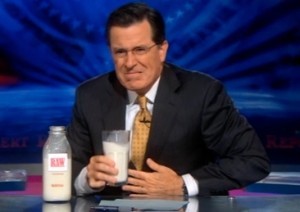In Dec. 2014, four children in the Australian state of Victoria developed hemolytic uremic syndrome linked to Shiga-toxin toxin producing E. coli in unpasteurized bath milk produced by Mountain View farm. One child died, and another developed cryptosporidiosis.
 The Victorian government quickly banned the sale of so-called bath milk, which although labeled as not fit for human consumption, was a widely recognized way for Australian consumers to access raw milk.
The Victorian government quickly banned the sale of so-called bath milk, which although labeled as not fit for human consumption, was a widely recognized way for Australian consumers to access raw milk.
Now, the neighboring state of New South Wales has stripped raw milk marketed as ‘cosmetic’ or ‘bath’ milk from the shelves of a number of Sydney health food shops following recent inspections.
As part of ongoing actions to address the sale of raw milk, the NSW Food Authority has enacted a range of proactive monitoring and compliance activities, which included the seizure of approximately 68 litres of unpasteurised dairy products in the Sydney area.
Minister for Primary Industries, Niall Blair, said retailers are on notice that claims the product is used for bathing will not wash.
“While there are no food businesses in NSW licensed by the NSW Food Authority to produce raw milk for cosmetic purposes, we know that some retailing businesses are sourcing this product from elsewhere to sell it,” Mr. Blair said.
“Raw milk is a high food safety risk – the sale of raw milk for human consumption is illegal in Australia and this kind of farcical deception won’t be tolerated. It was apparent to the NSW Food Authority that the sale of raw milk products at these premises was not for cosmetic reasons.
“The NSW Food Authority will continue to address retail businesses selling raw milk as bath milk and the NSW Government is committed to working with other states in an effort to find a national solution to the broader issue of the sale of raw milk.”
 Results from samples taken from the recent product seizures showed elevated levels of E. coli. Unpasteurised milk contains harmful bacteria such as E. coli, Salmonella and Listeria that can result in illness or even death.
Results from samples taken from the recent product seizures showed elevated levels of E. coli. Unpasteurised milk contains harmful bacteria such as E. coli, Salmonella and Listeria that can result in illness or even death.
The NSW Government will continue removing raw milk from NSW shelves. Random checks of retailers will continue, in line with the Food Authority’s policy of escalated enforcement.
Another area of focus is the practice of ‘herd sharing’, where a person enters into contract and purchase shares in a herd or individual cow to receive raw milk produced by that herd.
Claims that this does not constitute the sale of food are false: the operation of a herd share arrangement can constitute food for sale under the Food Act 2003. Milk for sale in NSW needs to be licensed with the NSW Food Authority to ensure it is subject to the stringent safety requirements of the Dairy Food Safety Scheme.
